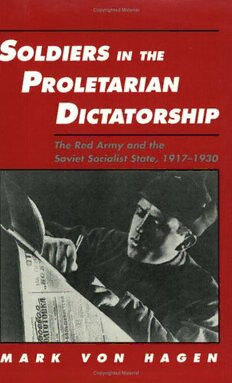
Soldiers in the Proletarian Dictatorship: The Red Army and the Soviet Socialist State, 1917-1930 PDF
Preview Soldiers in the Proletarian Dictatorship: The Red Army and the Soviet Socialist State, 1917-1930
THIS BOOK HAS BEEN SUPPORTED BY A GRANT FROM THE NATIONAL ENDOWMENT FOR THE HUMANITIES, AN INDEPENDENT FEDERAL AGENCY. Copyright © 1990 by Cornell University All rights reserved. Except for brief quotations in a review, this book, or parts thereof, must not be reproduced in any form without permission in writing from the publisher. For information, address Cornell University Press, Sage House, 512 East State Street, Ithaca, New York 14850. First published 1990 by Cornell University· Press. First printing, Cornell Paperbacks, 1993. International Standard Book Number 0-8014,.;2420-8 (cloth) International Standard Book Number 0-8014-8127-9 (paper) Library of Congress Catalog Card Number 89-36148" Printed in the United States of America Librarians: Library of Congress cataloging information appears on the last page of the book. (§) The paper in this book meets the minimum requirements of the American National Standard for Information Sciences-Permanence of Paper for Printed Library Materials, ANSI 239.48-1984. SOLDIERS IN THE PROLETARIAN DICTATORSHIP The Red Army and the Soviet Socialist State, 1917-1930 Mark von Hagen Studies of the Harriman Institute CORNELL UNIVERSITY PRESS Ithaca and London STUDIES OF THE HARRIMAN INSTITUTE Columbia University The Harriman Institute, Columbia University, sponsors the Studies of the Harriman Institute in the belief that their publication contributes to schol arly research and public understanding. In this way the Institute, while not necessarily endorsing their conclusions, is pleased to make available the re sults of some of the research conducted under its auspices. A list of the Studies appears at the back of the book. SOLDIERS IN THE PROLETARIAN DICTATORSHIP for my parents Contents Illustrations ix Preface xi Terms and Abbreviations xv Introduction 1 Part One. Revolution, Civil War, and Peace 1 Building a Socialist Army, February 1917-March 1919 13 Soldiers and Revolution 13 The Brief Era of the Volunteer Army 21 The Politics of the Conscript Army 36 Pressures for Reform 50 2 War and the Soviet State, April 1919-November 1920 67 Desertion and the Peasant Question 67 The Army and the Party 80 Soldiers' Culture and Political Work 89 A Breathing Space and Civilian-Military Conflicts 114 The Final Struggle 121 3 From War to Peace, November 1920-December 1922 127 The Dilemmas of Demobilization 127 The Army under Siege 132 The Tenth Party Congress 137 Defining Culture and Politics 152 Political Work in the Peacetime Army 163 The Crisis in Discipline 175 viii Contents Part Two. The Frunze Reforms 4 The Context of Reform, January 1923-February 1924 183 Communist Ethics and Generational Conflict 185 Trotsky's Struggle for Power 195 5 Militarization: Officers and Soldiers 206 Militia Compromise and Conscription 206 The Remaking of the Officer Corps 210 Trade Union Methods and Iron Discipline 220 6 Peasants, Civilians, and Army Politics 231 Rural Politics and the Peacetime Army 231 Militarization of the Civilian Populace 240 The Party and Komsomol 252 Part Three. A School of Socialism 7 Militarization and Sovietization: Political Culture in the Postreform Army 271 Toward the Two-Year Program 271 The Army as Family and School 279 Soviet Patriotism and Leninism 288 8 The Red Army and the Worker-Peasant Alliance, 1925-1930 295 Cadres for the Countryside 295 Soldiers and Collectivization 308 Conclusion 326 Bibliography 344 Index 359 Illustrations Leon Trotsky 26 Nikolai Podvoiskii 33 Woe to the deserter! 7 4 The deserter's nightmare 75 Literacy campaign 97 Description of a Red Army club 105 A military correspondent checks the daily press 108 A Red Army man points to his article in a wall newspaper 109 Comrades! Fight infection! Wipe out lice! 116 What do "health groups" do in the Red Army? 117 Comrades, to work! (demobilization poster) 128 Sergei Gusev 133 A political worker distributes literature in a Red Army club 169 A political lesson during summer maneuvers 170 Andrei Bubnov 201 Mikhail Frunze 204 Plenary session of the Revolutionary Military Council of the USSR, November 1924 220 Members of the Revolutionary Military Council of the USSR, 1925 221 Kliment Voroshilov 244 The Red Army is the school of citizenship 277 Morning exercises in a Red Army barracks 280 Red Army men reading letters from home 283
